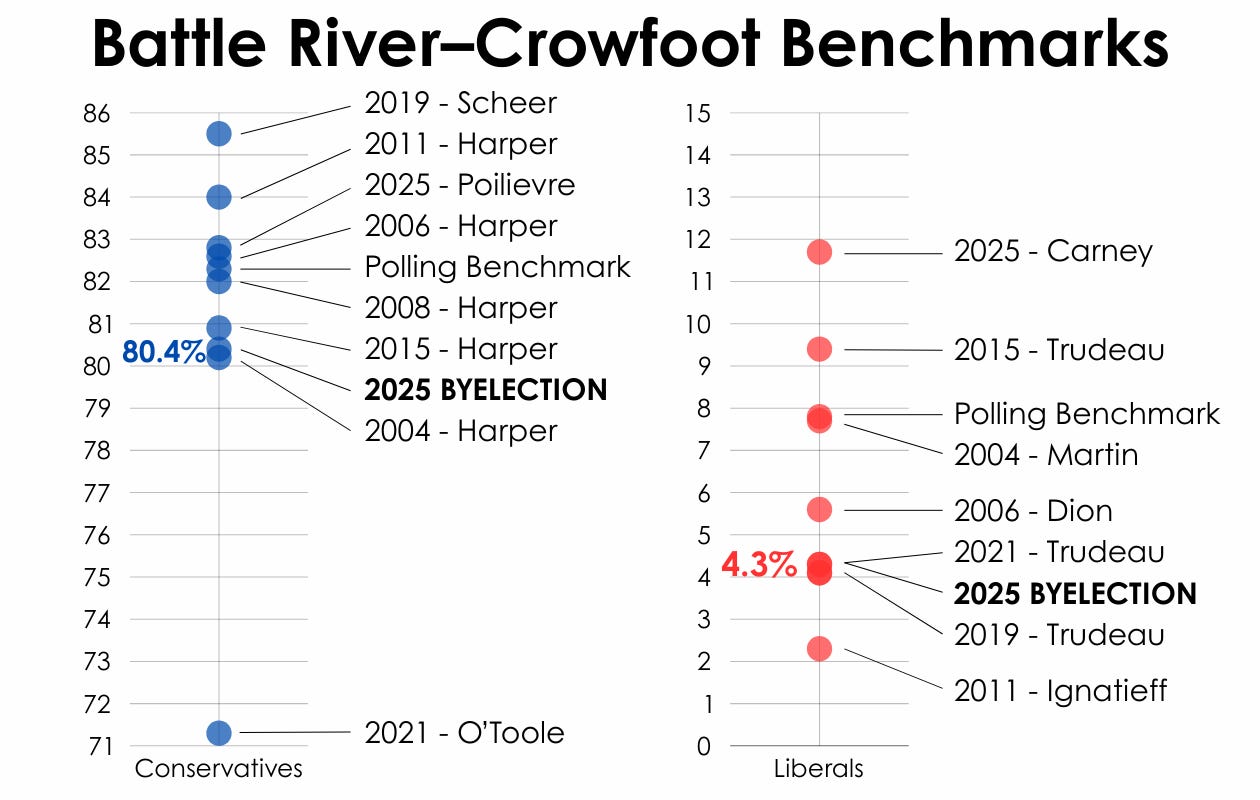Weekly Writ 8/21: On to the next test for Pierre Poilievre
A last look at the results in Battle River–Crowfoot. Plus, a new poll puts the PQ in the driver's seat in Quebec.
Welcome to the Weekly Writ, a round-up of the latest federal and provincial polls, election news and political history that lands in your inbox every Thursday morning.
The results of the Battle River–Crowfoot byelection fell went according to the first of Paul Wells’s Rules of Politics, namely that “Canadian politics will tend toward the least exciting possible outcome.”
Pierre Poilievre easily pulled off his switcheroo in the riding, winning one of the safest Conservative seats in the country by a wide margin. His result was neither overly impressive nor problematically low, meaning the byelection is unlikely to have any broader repercussions on his leadership of the party. It was the least exciting outcome possible.
Based on the historical benchmarks, Poilievre’s 80.4% in Battle River–Crowfoot was, as massive as it might be, on the lower side. Since the creation of the modern Conservative Party, only the 2004 and 2021 results in this seat were lower. But, with the sole exception of the 2021 election, the modern Conservatives have managed between 80% and 86% in this riding in every election. So, Poilievre’s 80.4% falls within that range. It was, when it comes down to it, a “normal” result for the Conservatives. Poilievre can dust himself off, trade the cowboy hat and boots for a suit and tie and head back to the House of Commons.
I’ll get into the results in a little more detail below, but if we’re assessing Poilievre’s score against the benchmarks I discussed last week, we have to do the same for the Liberals. Darcy Spady, with 4.3%, was also on the lower side of results for his party over the last eight elections. It matched exactly what the party managed in this riding under Justin Trudeau in 2021, and was only slightly above the party’s performances in 2011 and 2019. The Liberals were down from their result in 2025, but the special circumstances of this byelection — and the candidacy of Bonne Critchley — appear to have sapped some of the Liberals’ support.
Poilievre can now move on to the next set of challenges he faces as Conservative leader. His leadership review in January is the next big test, but what happens over the next few months might determine how easy it will be for him to pass that test.
The Conservatives are trailing the Liberals by a wider margin in the polls now than they did on election night and Pierre Poilievre has lost a significant amount of ground to Mark Carney on the preferred prime minister question. A poor showing in Battle River–Crowfoot combined with those polling numbers might have hobbled Poilievre heading into the fall sitting, emboldening the (few) critics he has within the Conservative Party. He didn’t have a poor showing in the byelection, but he still has his problematic polling. If he doesn’t improve on those numbers, then he might start sweating a little ahead of that judgment in January.
Now, to what is in this week’s instalment of the Weekly Writ:
An analysis of the results in Battle River–Crowfoot, along with a look at how the Liberals spent their money in 2024. Plus, the federal Greens need a new leader (again).
Polling shows the Parti Québécois in a strong position ahead of next year’s election. New polls also show the federal Liberals leading by a wide margin nationally and give us a hint of who are the Poilievre-Ford voters. Plus, new numbers on how Canadians viewed the Air Canada strike, how Ontarians view OLP leader Bonnie Crombie, and how Westerners feel about federalism.
#EveryElectionProject: Joey Smallwood takes on John Diefenbaker in the 1959 Newfoundland election.



